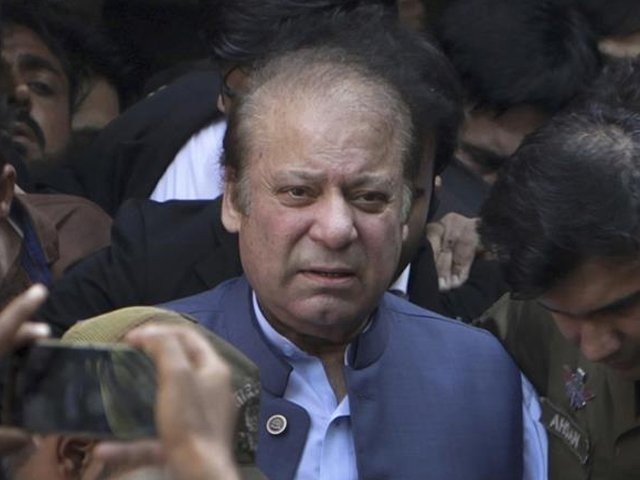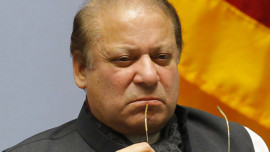
The Islamabad High Court (IHC) issued non-bailable arrest warrants for former prime minister Nawaz Sharif – for September 22 – in Al-Azizia case after the PML-N supreme leader failed to surrender to authorities on Tuesday.
The IHC also dismissed the PML-N leader’s three miscellaneous applications, requesting the court to forgo the requirement of his surrender; to allow him pursue the appeals against his conviction through a legal representative and to grant him exemption from court appearance.
Taking up Nawaz’s appeal against his conviction in Al-Azizia reference on September 1, a special division bench of the IHC directed the former PM to appear in the court on September 10 or face court proceedings to declare him an absconder.
An IHC bench on October 29, 2019 granted 8-week bail to Nawaz in Al-Azizia case in view of his deteriorating health condition and the special bench on September 1 noted that Nawaz was not on bail now and, therefore, he must “surrender to the authorities before the next date of hearing”.
The PML-N leader has been in London since November 2019.
On September 9, Nawaz Sharif filed an application in the court, requesting it to forgo its order of surrender and either to defer hearing of his appeals till his returns to Pakistan or allow his representative counsel to appear on his behalf.
On September 10, the IHC bench decided to reconvene on September 15 [Tuesday] to hear arguments on whether Nawaz Sharif’s appeal could be heard while he was declared an absconder by an accountability court in a gift repository case.
Resuming hearing of the case on Tuesday, the IHC bench headed by Justice Aamer Farooq observed that despite orders the former premier had neither returned to Pakistan nor surrendered to authorities.
“First we will listen to Khawaja Haris's [Nawaz’s lawyer] arguments then we will listen to NAB's [National Accountability Bureau] application [seeking cancellation of Nawaz’s bail in Avenfield reference].
Haris referred to former president General Pervez Musharraf's case and said in the case related to the investigation into the former president's assets his lawyer was allowed to appear before the court on his behalf.
“Therefore, in exceptional circumstances, the accused's lawyer can be allowed to appear instead of the accused himself,” Haris argued. “In a high-treason case, the special court had declared General Pervez Musharraf an absconder. Despite it, the Supreme Court heard his lawyer.”
He said a trial cannot be stopped on the basis of non-appearance of an accused. The court could appoint a public prosecutor for the accused and proceed with the trial. As of now, Nawaz Sharif cannot appear before the court," Sharif's counsel further stated.
Haris also referred to the Supreme Court’s Hayat Baksh case of 1981, stating that the apex court had formulated a procedure to declare an accused absconder.
The court, however, asked him to describe the unusual circumstances that he thought applied to Nawaz’s case. Haris said the SC heard the plea of a fugitive accused for various reasons.
"Nawaz Sharif's case is similar as he spent time in jail after his conviction and filed an appeal. The court has to now decide whether Nawaz Sharif is an absconder or not,” Haris argued.
“In the case you referred to, the accused had escaped from jail,” noted Justice Mohsin Akhtar Kayani, the second member of the bench. Nawaz’s counsel said it was a more serious crime in which the appeal of the accused was decided on merit.
You are saying that even if Nawaz Sharif is declared a fugitive, the court should decide his appeal on merit, the court asked. Counsel Harris replied that he had also requested that no adverse action be taken even if his client is absent.
“You have made it very clear what your petition is. Nawaz Sharif's bail in Al-Azizia reference is ineffective and he did not surrender before the court,” said one of the judges. During the hearing, the additional NAB prosecutor general said that petitions filed by Nawaz Sharif were inadmissible.
“Let's assume that Nawaz Sharif's request came before he was declared an absconder. In this case, his application will be rejected as the basic rule is that the accused must surrender,” the prosecutor argued.
“The fugitive accused can be sentenced to three years imprisonment under NAB ordinance. It is the responsibility of the person representing the accused to ensure the presence of the accused,” he said.
The NAB prosecutor said Nawaz Sharif was deliberately disobeying the court orders, and that the court has the power to reject the fugitive's appeal or to appoint a lawyer for him.
“The court gave Nawaz Sharif two chances to surrender but he did not,” he said. “Giving relief to fugitives will affect the justice system,” the prosecutor argued.
The court inquired how it could hear NAB’s appeal without the presence of the accused. Can the court decide without listening to the other side? the bench asked.
“For this, the court can appoint a legal representative and hear it,” NAB official said. The court replied that then this principle would also apply to the other appeals of Nawaz Sharif.
Justice Kayani said the person who took bail [Nawaz Sharif] did not undergo any surgery nor was admitted to any hospital after going abroad. "What should happen now that Nawaz Sharif's bail has finished?” he asked.
Former premier's counsel reiterated that his client is not a fugitive since he took permission from the government to go abroad.
“It is true that Nawaz Sharif's bail has expired. Now the only question is whether he is in a position to return to Pakistan or not. The issue of Nawaz Sharif's return is also being heard in the Lahore High Court (LHC),” Haris said.
The court remarked that the bail was for a specific period and this may not have been reported to the LHC. Why are you giving references to Nawaz's cases in the LHC. Plead the case which is at hand, the court told the counsel.
Haris said his client has provided a new medical certificate, according to which the former premier is not fit to return home.
"NAB and the federal government did not present anything in denial of these medical certificates .If these certificates are undeniable then how can an order be issued against Nawaz Sharif," Haris asked.
The court remarked that the medical certificates provided were of a consultant and not a hospital. It is unfortunate that all parties in Nawaz Sharif's case have made the matter suspicious, the IHC observed.
Counsel Haris said Nawaz's treatment was hindered due to Covid-19 outbreak. The bench, however, issued non-bailable arrest warrants for Nawaz Sharif for September 22.










































COMMENTS
Comments are moderated and generally will be posted if they are on-topic and not abusive.
For more information, please see our Comments FAQ